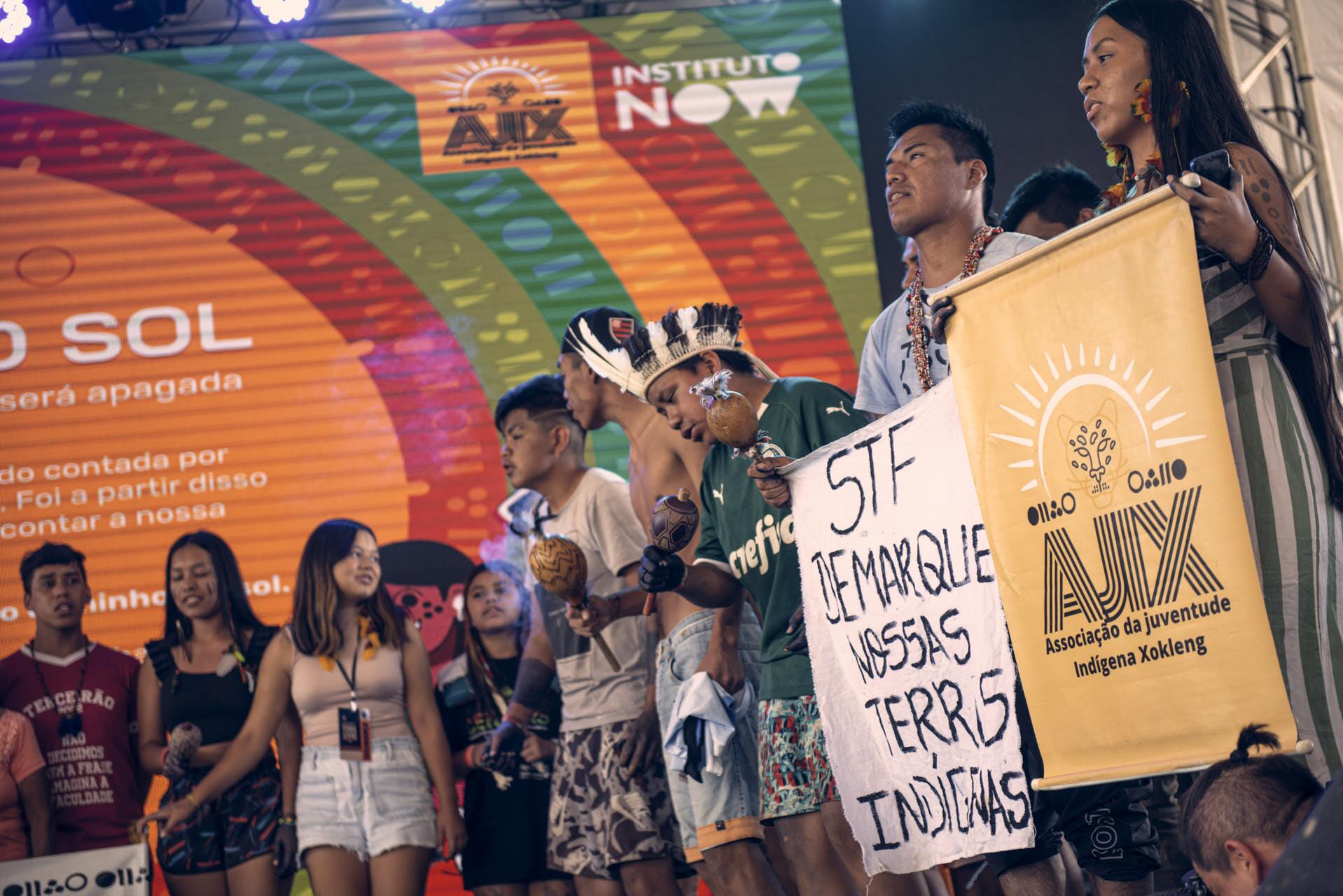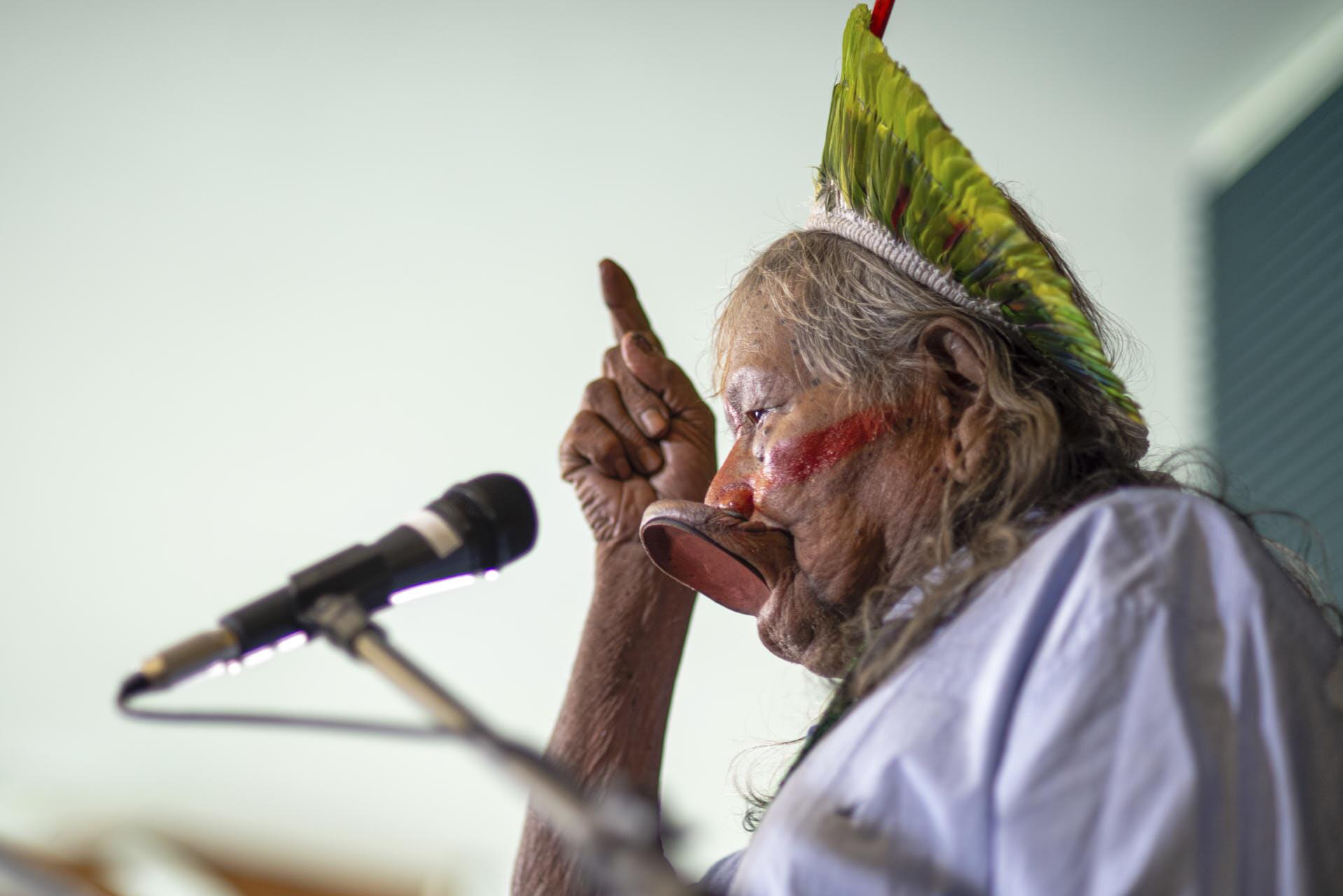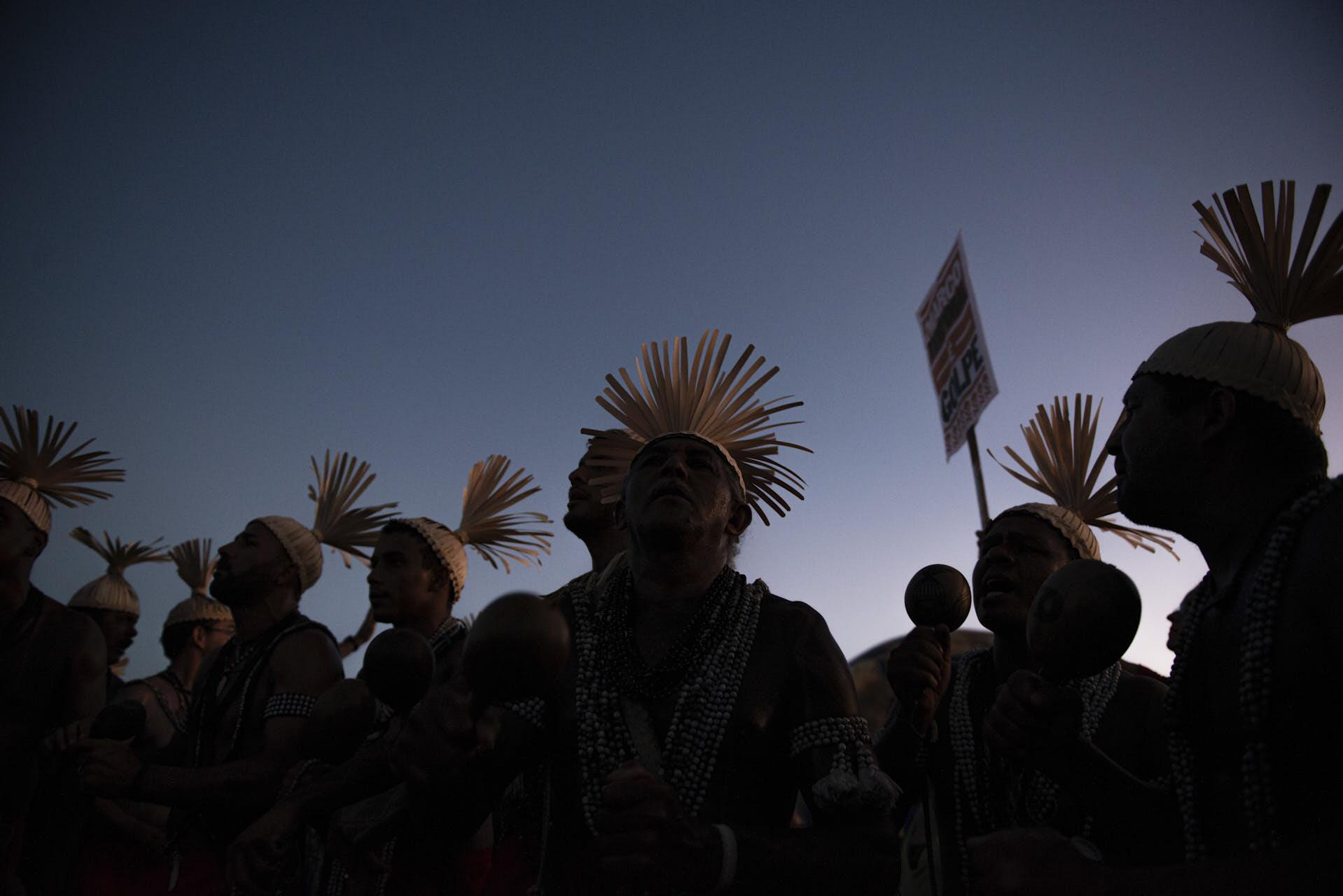For centuries, Brazil’s original peoples have been engaged in a battle, and no history book can cover all the violence these peoples have faced for the last 523 years. To the sound of maracas, rituals, and singing, Indigenous people from northern to southern Brazil gathered in the nation’s capital in April for the nineteenth Free Land Camp (ATL), attended this year by some six thousand people—once again “demarcating” Brasilia. The movement feels that President Luiz Inácio Lula da Silva, of the Workers’ Party, is committed to resuming the policy of demarcating Indigenous territories and to protecting their ancestral lands, but they are unhappy about his silence concerning the “timeframe thesis” (marco temporal), an issue the Federal Supreme Court will take up again on June 7.
For the Indigenous movement, this will be the “decision of the century,” as it will define the future of Brazil’s original peoples. Leaders heard by SUMAÚMA believe that Congress, which is hostile to Indigenous demands, is currently the main obstacle to ensuring their rights—and is also the biggest problem for Lula if he wants to keep the promises he made.
The cacique [leader] of the Xokleng people, Tucun Gakran, is of the opinion that Lula is against the timeframe thesis but hasn’t spoken out openly because he is leery about how members of Congress might react. A total of 350 of Brazil’s 513 federal deputies have joined the Agricultural Parliamentary Front and are considered members of the so-called Ruralist Bloc. “As cacique of the Xokleng people, I believe Lula is interested in demarcating lands. But we have members of Congress on the other side who are against the government’s plans. So, I think he’s afraid to make any statements,” said Gakran.
Lula didn’t pronounce himself on the timeframe thesis while at the Free Land Camp. The tenor of the thesis is that only those Indigenous peoples who were occupying their land when Brazil enacted its 1988 Constitution are entitled to Indigenous territories. However, many of these peoples were expelled from their lands before or during the business-military dictatorship (1964-1985). The president’s only nod to the issue while at the Free Land Camp was that while giving a speech, he grew irritated by a banner that was blocking the audience’s view and asked that it be brought up to the stage. The banner read: “Xokleng youth against the timeframe thesis.”

Young Xokleng people, at the Free Land Camp (ATL): Indigenous youth are engaged in their relatives’ struggle against the Time Limit Trick, the theory under which the right to territory is only granted if the original peoples occupied it at the date of the enactment of the 1988 Constitution. Photo: Matheus Alves/SUMAÚMA
Cacique Tucun Gakran said the Indigenous people are hopeful that Lula will keep his promises. But he has reservations: “The current moment, at the start of the administration, is very difficult, we can see that.” He went on to say that the Indigenous movement had hoped Lula would ratify at least fourteen Indigenous territories instead of the six he actually has. “We believed he would approve at least what was there on paper. But with these problems he’s having, even inside the government, there are people who are against him. And we know this because I had about three meetings this year at the AGU [Attorney General’s Office].” In Gakran’s view, some in the AGU are in favor of the timeframe thesis and want it approved. “Lula has a good idea, good intentions to help the people, but we’re worried,” he admits.
With his serene appearance, salt-and-pepper hair, green and red feather headdress, string of beads around his waist and firmness in his speech, Raoni Metuktire, of the Kayapó people, is a symbol of Indigenous resistance in Brazil and around the world. Over ninety years old, he asked the Indigenous peoples to continue fighting, even if they do trust the government. “I want the Lula administration to be good for us. But we, the leaders, will continue fighting. We will stand firm, and the young people can’t make things too easy for the white people, because there are many kinds of things on our land, there are animals, fruit, and other species. And we need to fight for this,” he said.

Cacique Raoni Metuktire Kaiapó speaks at the launch of the Mixed Parliamentary Front for the Defense of Indigenous Peoples’ Rights, at the National Congress. A symbol of the Indigenous peoples’ struggle for decades, who had a bad experience with the stance adopted by the Workers Party in relation to the Belo Monte power station, Raoni warned Indigenous leaders to remain firm and continue making demands to Lula’s government. Photo: Matheus Alves/SUMAÚMA
Raoni, who fought against Belo Monte and was betrayed by the previous Workers’ Party administrations, knows that Indigenous people cannot make the mistake of letting their guard down. So he asked everyone to join together in pressuring the government. He also said they must support their “relatives” [other Indigenous] in the government. “Everyone needs to come together and speak with one voice to defend our rights. The leaders in the government have to listen to the people who are in the [Indigenous] territories. Together we will be strong, these are my thoughts,” Raoni said at the end of his visit to the Free Land Camp.
Anti-Indigenous Congress
For the leader Almir Surui, cacique-general of the Surui people of the Sete de Setembro Indigenous Land in the state of Rondônia, it is both important and necessary to have Indigenous people in the government for the first time. According to the cacique, the presence of Sonia Guajajara, Joenia Wapichana, and Ricardo Weibe Tapeba should be commemorated as something that strengthens the Indigenous movement, but roles and spaces need to be defined: “We cannot mistakenly think we are the government. The movement has to continue putting on the pressure so they can fulfill their governmental role, defending the rights of the Indigenous people, protecting the territories, seeking alternatives that can generate employment and income within the communities that need it, as well as improving health and education policies.”
Brazil’s current Congress is one of the most conservative in recent times, said the secretary of the Coordination of Indigenous Organizations of the Brazilian Amazon (Coiab), Marciely Ayap, of the Tupari people. “We heard a lot of questioning about why have a Free Land Camp, given that we have a government that is in favor of the Indigenous peoples… I answered that even we, in a new government, have an uphill struggle, particularly in the Senate and lower house, because not all members of Congress support the struggle of the Indigenous peoples,” she said.
Even though the current administration created the Ministry of Indigenous Peoples, and the federal agency of Indigenous affairs Funai is now headed by an Indigenous woman, the mobilizations must continue, “to show everyone we remain united and demanding our rights,” Marciely said. The presence of Indigenous leaders in Lula’s government is not enough to give the Indigenous peace of mind because, according to Marciely, they are barred from various other spheres of power, including within the government itself.
Djacir da Silva, of the Macuxi people, tuxaua [leader] of the Maturuca community in Raposa Serra do Sol Indigenous Territory, says his “relatives” will remain in the rearguard, defending Indigenous rights. “We are mobilizing to say we will not stand idly by. We have to work together with government officials. We are witnessing destruction and all the invasions of Indigenous territories that have been taking place,” he said. “We have to mobilize. There are members of Congress who are violating our rights, and for this reason we will continue to speak up. The [Supreme Court hearing of the] timeframe thesis is coming. Let’s unite and hold firm to the Indigenous struggle, which never stops.”
Translation into Spanish: Meritxell Almarza
English translation: Mark Murray
Photography editing: Marcelo Aguilar, Mariana Greif and Pablo Albarenga
Page setup: Érica Saboya

Indigenous people also declared a climate emergency during the days they were together at the 2023 edition of the Free Land Camp (ATL), in Brasilia: the Xucuru people performed dances and rituals during the march in the federal capital. Photo: Matheus Alves/SUMAÚMA





